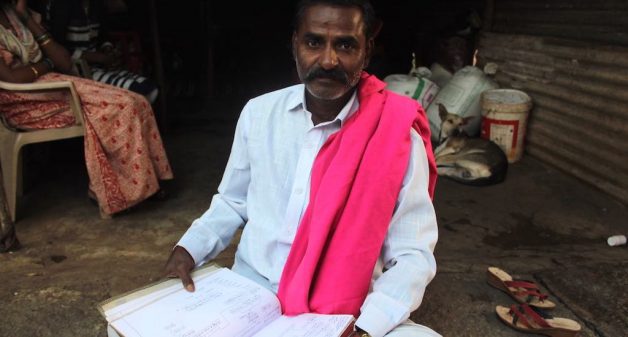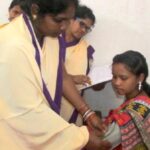Fifty-year-old Lakshman Helavar’s day starts at 4 am. Bathing in the wee hours is followed by pooja rituals and dressing up in the customary Helava attire. Clad in white-shirt-dhoti, coat and a Gandhi cap, Lakshman visits various houses till early evening, reading out carefully preserved family lineages.
Lakshman belongs to the Helavaru community, a unique semi-nomadic tribe credited to have maintained documents containing genealogy of several families in 10 districts of Karnataka — Belgaum, Dharwad, Bijapur, Bagalkot, Haveri, Gadag, Bellary, Uttara Kannada, Davangere and Chitradurga.
The term Helava is reported to have been coined from heluvava meaning ‘he who speaks’. It is believed that Helavas started practicing from the days of Basavanna, a 12th century social reformer who rebelled against caste hierarchy and gender discrimination. Ever since, they have carried on the practice of visiting households and narrating ancestral bloodlines in a lyrical fashion.
Helavas’ distinctive profession probably makes them the only tribe in India that has sustained the recitation of family histories for centuries. Despite odds, they carry on, with the hope that some of their offspring would continue the tradition.
Migratory hardships
It has been almost 30 years since Lakshman Helavar and his elder brother Mahesh Helavar (52) left Gujanala, their native village in Belguam’s Gokak taluk. Unlike other Helavas who migrate from their villages to narrate genealogies during winter months, Lakshman chose to settle down in a humble jhopadpatti (hutment) in the suburbs of Belguam city, along with 10 other Helava families.

“We are tired of moving around in bullock carts all the time,” Lakshman told VillageSquare.in. “Safe-guarding our records from occasional rains is an issue.” Helavas wrap their archival records in a fluorescent pink shawl and carry them over their shoulders during their journeys.
While some use their carts as convertible shelters, some Helava groups camp in the same place on the outskirts of several cities every year. The Helava women are usually engaged in household chores and rearing livestock.
They usually go on foot for their genealogy related visits, covering nearly 20 houses per day. However, people like Mahesh have upgraded in their own ways. “Since walking on foot for kilometers is difficult, we took informal loans to buy scooters,” said Mahesh. Seasonal migration of Helava families also affects the education of their children.
Distinct profession
There are several sub-sects within Helavas namely Ettina Helava, Goobe Helava, Kappe Helava, Mandala Helava, Adavi Helava, etc. The Etihasa Helavas or those who recite genealogies are believed to be an unadulterated group that does not mingle with other sub-sects.
Having dropped out of elementary school, Lakshman and Mahesh learnt the art of the reciting vamsha vruksha (genealogies) from their father. The elaborate narrations include details of family pedigrees, dating back to four or five generations.
Helavas also recount the migratory history of families (from one village to another) in a song-like manner. Their oral storytelling sessions last about an hour and are rewarded in cash and kind. Each recital ends with updating new details related to births, deaths, marriages, etc.
Remuneration
“In the olden days, people used to look forward to the annual visit of Helavas,” said Lakshman. “People gifted food grains, brass vessels, old jewelry and even cattle.” According to the Helava women that VillageSquare.in spoke to, salt, sugar, kerosene and tea dust are the only supplies that they need to buy from the market even today.

Presently, the payments they receive depend on special occasions such as births and marriages. “On lucky days, we make up to Rs 2,000 and some days we return with almost nothing,” Mahesh Helavar told VillageSquare.in.
Reliable records
Helavas preserve their ancestral archives with utmost care. “We safeguard these books like our life,” said Lakshman, pointing towards his red book with artistically drawn family trees. “Each book consists of family genealogies of people in three or four villages. We make more than one copy of each book, fearing theft or damage.”
Belguam civil court summoned Mahesh twice in the last two decades. On both occasions, judges questioned him about ancestral descents of families involved in property disputes. Till date, the genealogical records maintained by Helavas are accepted as valid proof in cases pertaining to family feuds.
Irrespective of their caste, several people still contact Helavas to collect details about their family deity and bedagu (relations between different clans) while matching horoscopes of bride and groom. Though Helavas keep up-to-date information of all weddings in a family, they do not record child marriages in their genealogical registries. “It is against our ethics and rules,” said Lakshman.
Fading tradition
Like most other tribal heritages, the exceptional Helava practice of narrating genealogies is also fast diminishing with the advent of modern technology and computerization. Need for better education and stereotypes associated with the profession have made things worse.
Echoing thoughts of other community members, Mahesh said that the educated younger generation has little interest in keeping the Helava custom alive. “Too much education is bad for our profession,” he said.
“Our children laugh when we sing the genealogies,” he said, as his youngest son Uday smiled. “Once they migrate to cities in search of work, there is no coming back.” Today, many educated Helavas are employed in manufacturing industries, corporate companies and government departments such as the police forces.
Mahesh considers himself fortunate for being able to send his children to a nearby government school unlike most others from his clan. “I cannot afford private tuitions, but I really hope at least one of my five children grows up to be a policeman,” he said.
Declining relevance
According to Lakshman, the Helava tradition is respected and regarded by many including administrative officers, judges and politicians. “They patiently listen to our narrations and reward us well,” he said. However, the zeal is not the same with their millennial children. “They are more engrossed in entertainment modes like television, computer and mobile phones. So they don’t pay heed to lineages,” said Lakshman.
Helavas are known to visit their clients (families whose records they maintain) in their place of work, even if it means traveling to cities. Today, they also note down phone numbers of eminent personalities who request them to call before they visit for genealogical narrations.
Centuries ago, when government census, birth and death registrations did not exist, Helavas did great service to people by maintaining records of genealogies. However, sustaining themselves and their large Helava families in a rapidly modernizing world comes with multiple challenges for people like Lakshman.
Uncertain future
“We would love to keep our traditional custom going, but I doubt if we can pass on the legacy,” said Lakshman. “We try to teach the nuances related to our ancestral occupation to at least one of our male children,” said Mahesh.
The government of Karnataka is yet to recognize the need to digitize the valuable Helava records. “Forget digitization, we are yet to receive any basic support. If they can just give us some irrigated land, we can supplement our earnings and save some money for personal emergencies,” Mahesh told VillageSquare.in.
Currently many Helavas depend on informal loans for family functions and higher education of their children. They have neither collateral nor relevant documents like ration cards, to avail bank loans.
In the recently concluded winter session of Karnataka government, a group of Helavas from Belgaum met officials from the Social Welfare Ministry and submitted a petition to include them in the list of scheduled castes. They are currently listed under category 1 of Other Backward Classes (OBCs), Only time will tell if efforts to uplift Helavas would help preserve their unique tradition.
Amoolya Rajappa is a Bengaluru-based journalist. Views are personal.








